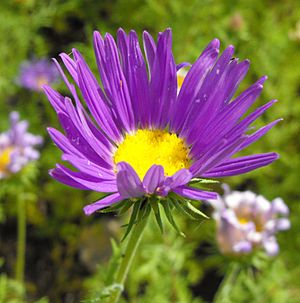Tansyleaf tansyaster facts for kids
Quick facts for kids Tansyleaf tansyaster |
|
|---|---|
 |
|
| Scientific classification | |
| Kingdom: | |
| (unranked): | |
| (unranked): | |
| (unranked): | |
| Order: | |
| Family: | |
| Genus: |
Machaeranthera
|
| Species: |
M. tanacetifolia
|
| Binomial name | |
| Machaeranthera tanacetifolia (Kunth) Nees
|
|
| Synonyms | |
|
Machaeranthera coronopifolia |
|
Machaeranthera tanacetifolia is a type of beautiful flowering plant. It belongs to the aster family, which is a very large group of plants. People often call this plant the tansyleaf tansyaster or the Tahoka daisy. It gets its name "tansyleaf" because its leaves look a bit like those of the tansy plant.
This plant grows naturally in parts of northern Mexico and the southwestern and central United States. You can find it in many different kinds of places, from dry areas to more open fields. It's an annual or biennial plant, which means it either lives for one year or two years.
Contents
About the Tahoka Daisy
The Tahoka daisy is a fascinating plant with pretty flowers. It's known for its bright colors and unique leaf shape. Learning about plants like this helps us understand nature better.
What It Looks Like
The Tahoka daisy grows one or more stems that branch out. These stems can reach up to about 70 centimeters (28 inches) tall. The leaves are long, up to 12 centimeters (4.7 inches), and have many deep cuts or lobes. This gives them a feathery look.
The Flowers
The plant produces one or more flower heads. Each flower head looks like a single large flower, but it's actually made of many tiny flowers grouped together. Around the outside of the flower head are special leaf-like parts called phyllaries. These phyllaries can spread out or curl.
In the center of the flower head, you'll see many small yellow "disc florets." These are the tiny flowers that make up the middle part. Around the edge, there's a fringe of "ray florets." These are the showy, petal-like parts that are usually lavender to purple. Each ray floret is about 1 to 2 centimeters (0.4 to 0.8 inches) long.
Seeds and Fruit
After the flower blooms, it produces a flat fruit called an achene. This achene is about 1 centimeter (0.4 inches) long. It has a fluffy top part called a pappus. The pappus helps the seeds float away in the wind, spreading them to new places.
Where It Grows
The Tahoka daisy likes to grow in various natural environments. It's common in the dry, sunny regions of the southwestern United States and Mexico. It can be found in grasslands, open woodlands, and even along roadsides. This shows how tough and adaptable this plant can be.
Special Uses
Some Native American communities have traditionally used this plant. For example, the Zuni people used an infusion (a type of herbal tea) made from the flowers. They would mix it with other flowers to help with certain illnesses. This shows how people have learned to use plants around them for different purposes.
Images for kids
 | Janet Taylor Pickett |
 | Synthia Saint James |
 | Howardena Pindell |
 | Faith Ringgold |

